The Importance of Parental Involvement in Early Childhood Education
VerifiedAdded on 2023/05/27
|9
|1473
|204
AI Summary
The involvement of family in early childhood education is very important. It sets the foundation for lifelong learning in both parents and their children. It cultivates a caring and a self-motivated attitude in children. It breeds good communication skills in a child.
Contribute Materials
Your contribution can guide someone’s learning journey. Share your
documents today.
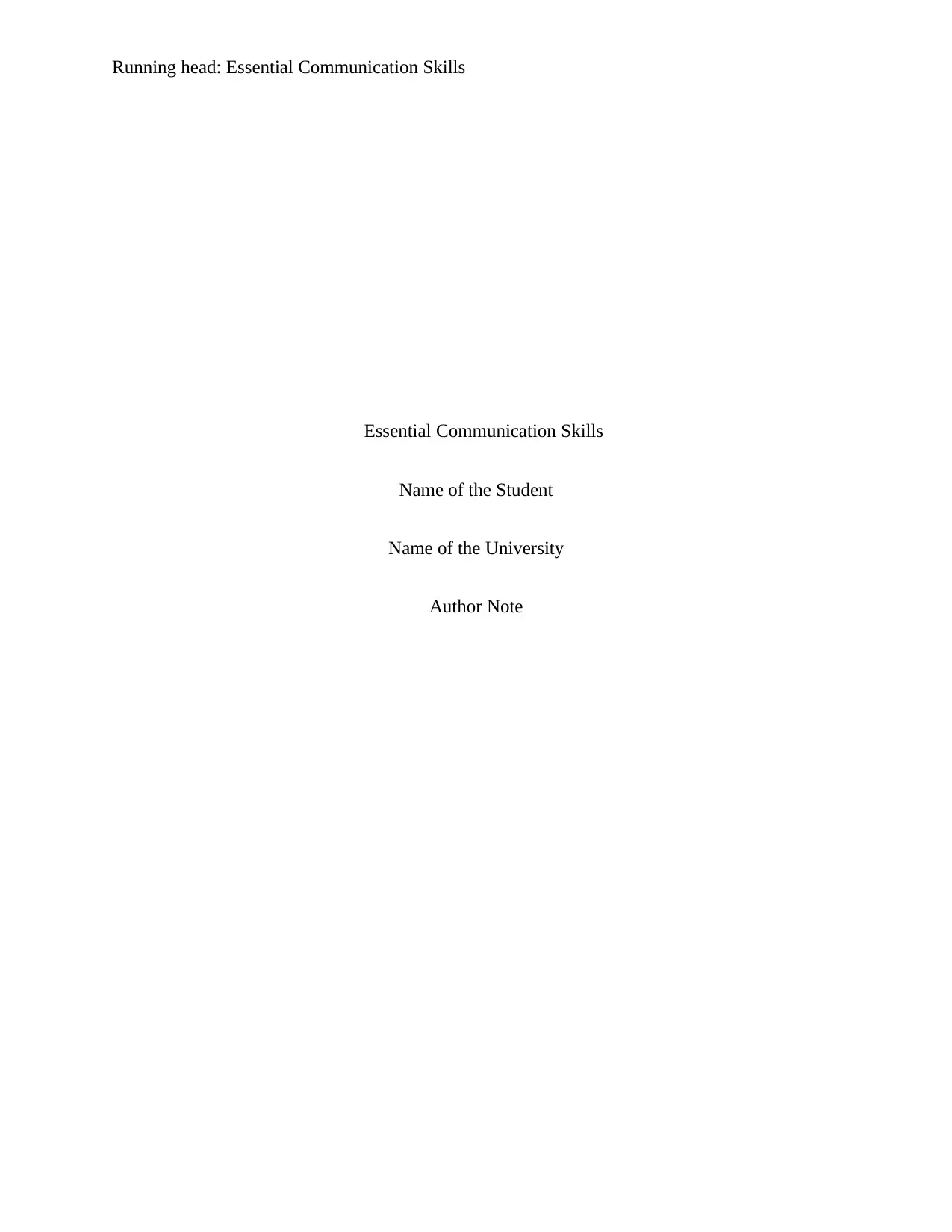
Running head: Essential Communication Skills
Essential Communication Skills
Name of the Student
Name of the University
Author Note
Essential Communication Skills
Name of the Student
Name of the University
Author Note
Secure Best Marks with AI Grader
Need help grading? Try our AI Grader for instant feedback on your assignments.
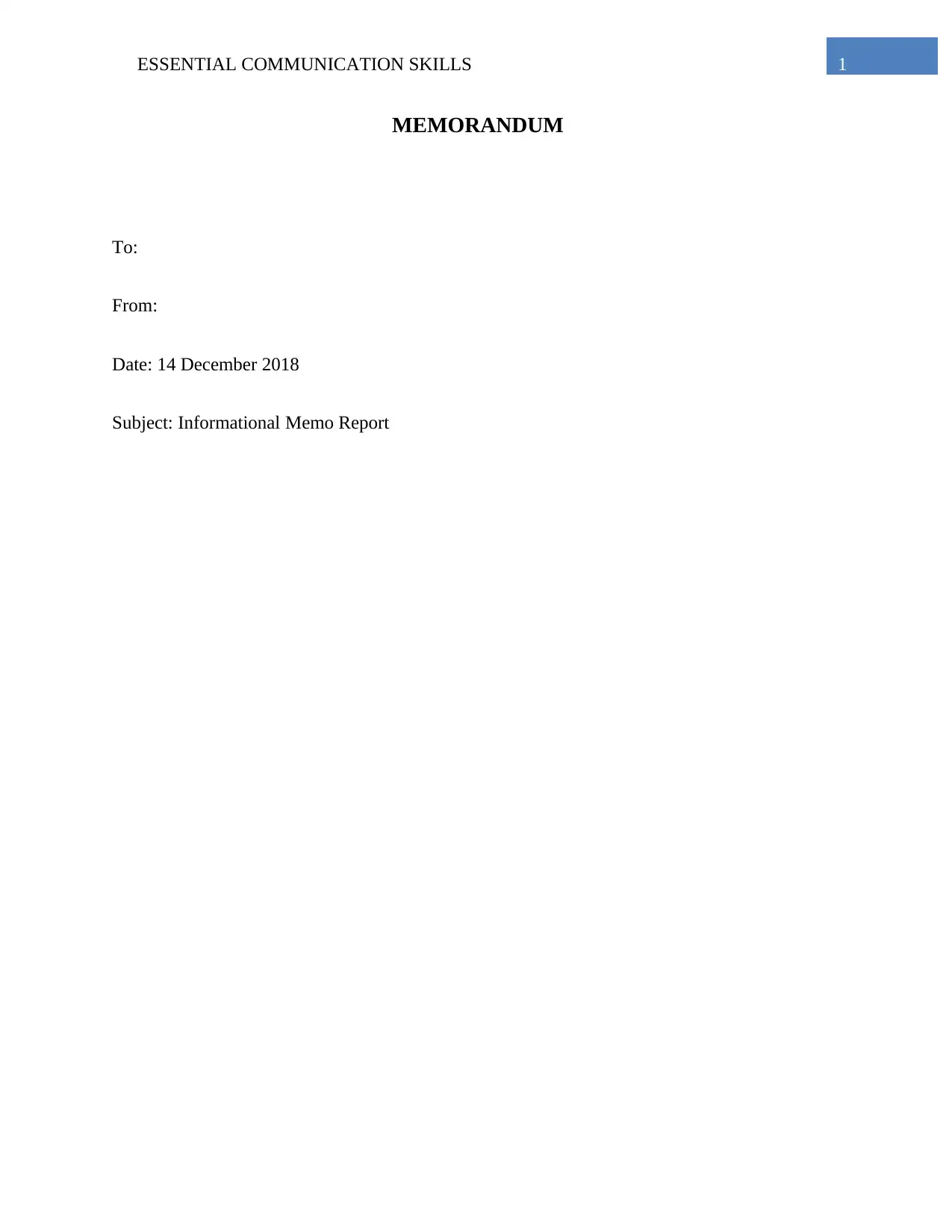
1ESSENTIAL COMMUNICATION SKILLS
MEMORANDUM
To:
From:
Date: 14 December 2018
Subject: Informational Memo Report
MEMORANDUM
To:
From:
Date: 14 December 2018
Subject: Informational Memo Report
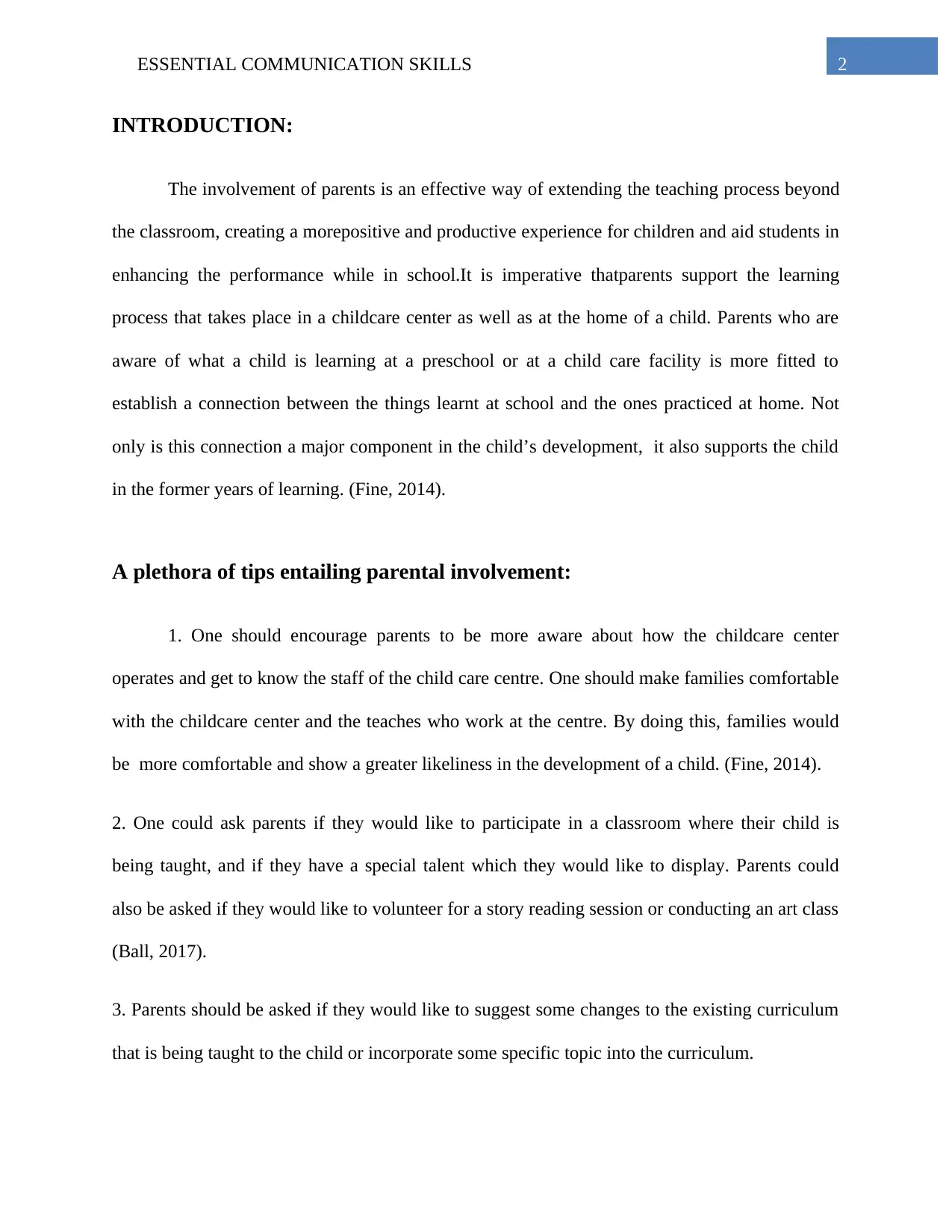
2ESSENTIAL COMMUNICATION SKILLS
INTRODUCTION:
The involvement of parents is an effective way of extending the teaching process beyond
the classroom, creating a morepositive and productive experience for children and aid students in
enhancing the performance while in school.It is imperative thatparents support the learning
process that takes place in a childcare center as well as at the home of a child. Parents who are
aware of what a child is learning at a preschool or at a child care facility is more fitted to
establish a connection between the things learnt at school and the ones practiced at home. Not
only is this connection a major component in the child’s development, it also supports the child
in the former years of learning. (Fine, 2014).
A plethora of tips entailing parental involvement:
1. One should encourage parents to be more aware about how the childcare center
operates and get to know the staff of the child care centre. One should make families comfortable
with the childcare center and the teaches who work at the centre. By doing this, families would
be more comfortable and show a greater likeliness in the development of a child. (Fine, 2014).
2. One could ask parents if they would like to participate in a classroom where their child is
being taught, and if they have a special talent which they would like to display. Parents could
also be asked if they would like to volunteer for a story reading session or conducting an art class
(Ball, 2017).
3. Parents should be asked if they would like to suggest some changes to the existing curriculum
that is being taught to the child or incorporate some specific topic into the curriculum.
INTRODUCTION:
The involvement of parents is an effective way of extending the teaching process beyond
the classroom, creating a morepositive and productive experience for children and aid students in
enhancing the performance while in school.It is imperative thatparents support the learning
process that takes place in a childcare center as well as at the home of a child. Parents who are
aware of what a child is learning at a preschool or at a child care facility is more fitted to
establish a connection between the things learnt at school and the ones practiced at home. Not
only is this connection a major component in the child’s development, it also supports the child
in the former years of learning. (Fine, 2014).
A plethora of tips entailing parental involvement:
1. One should encourage parents to be more aware about how the childcare center
operates and get to know the staff of the child care centre. One should make families comfortable
with the childcare center and the teaches who work at the centre. By doing this, families would
be more comfortable and show a greater likeliness in the development of a child. (Fine, 2014).
2. One could ask parents if they would like to participate in a classroom where their child is
being taught, and if they have a special talent which they would like to display. Parents could
also be asked if they would like to volunteer for a story reading session or conducting an art class
(Ball, 2017).
3. Parents should be asked if they would like to suggest some changes to the existing curriculum
that is being taught to the child or incorporate some specific topic into the curriculum.
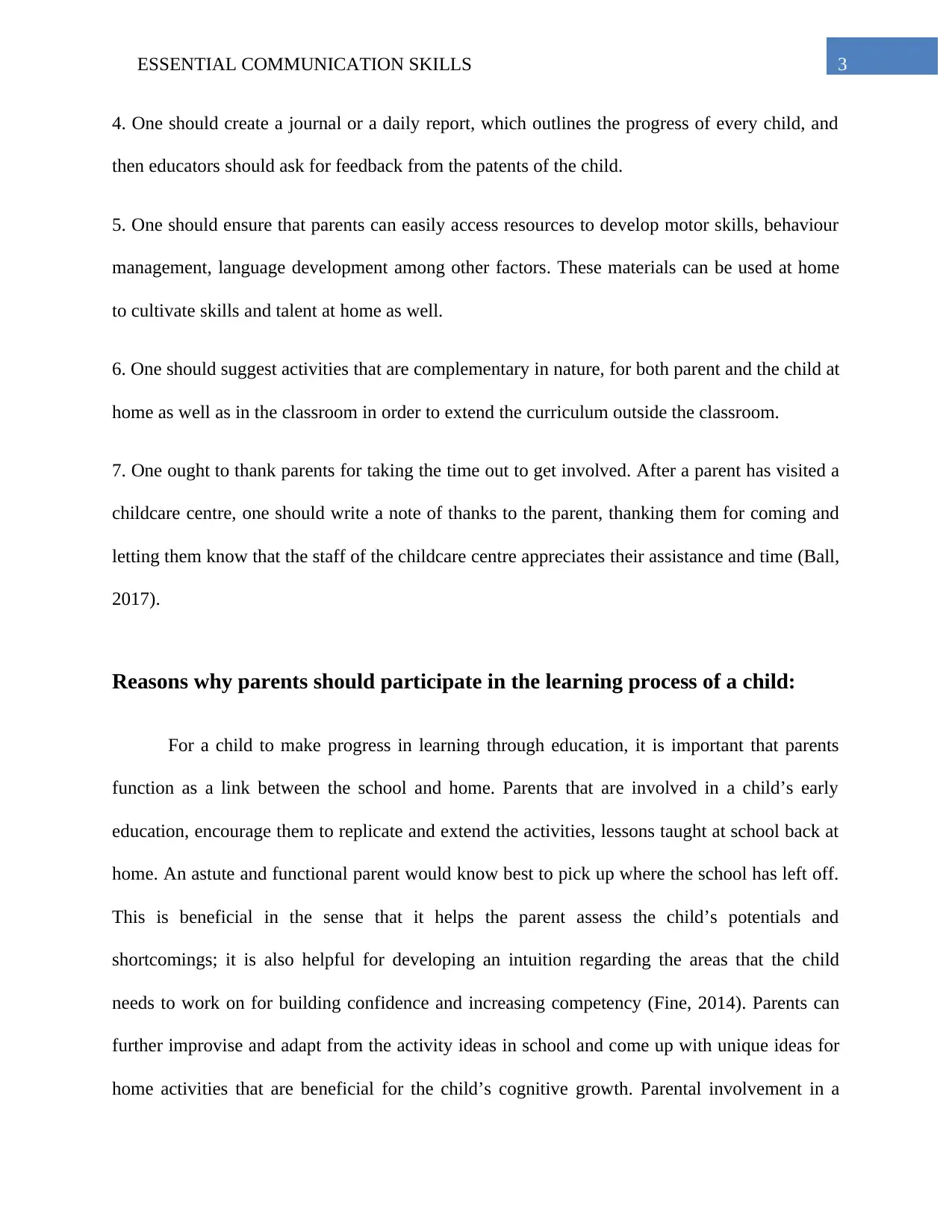
3ESSENTIAL COMMUNICATION SKILLS
4. One should create a journal or a daily report, which outlines the progress of every child, and
then educators should ask for feedback from the patents of the child.
5. One should ensure that parents can easily access resources to develop motor skills, behaviour
management, language development among other factors. These materials can be used at home
to cultivate skills and talent at home as well.
6. One should suggest activities that are complementary in nature, for both parent and the child at
home as well as in the classroom in order to extend the curriculum outside the classroom.
7. One ought to thank parents for taking the time out to get involved. After a parent has visited a
childcare centre, one should write a note of thanks to the parent, thanking them for coming and
letting them know that the staff of the childcare centre appreciates their assistance and time (Ball,
2017).
Reasons why parents should participate in the learning process of a child:
For a child to make progress in learning through education, it is important that parents
function as a link between the school and home. Parents that are involved in a child’s early
education, encourage them to replicate and extend the activities, lessons taught at school back at
home. An astute and functional parent would know best to pick up where the school has left off.
This is beneficial in the sense that it helps the parent assess the child’s potentials and
shortcomings; it is also helpful for developing an intuition regarding the areas that the child
needs to work on for building confidence and increasing competency (Fine, 2014). Parents can
further improvise and adapt from the activity ideas in school and come up with unique ideas for
home activities that are beneficial for the child’s cognitive growth. Parental involvement in a
4. One should create a journal or a daily report, which outlines the progress of every child, and
then educators should ask for feedback from the patents of the child.
5. One should ensure that parents can easily access resources to develop motor skills, behaviour
management, language development among other factors. These materials can be used at home
to cultivate skills and talent at home as well.
6. One should suggest activities that are complementary in nature, for both parent and the child at
home as well as in the classroom in order to extend the curriculum outside the classroom.
7. One ought to thank parents for taking the time out to get involved. After a parent has visited a
childcare centre, one should write a note of thanks to the parent, thanking them for coming and
letting them know that the staff of the childcare centre appreciates their assistance and time (Ball,
2017).
Reasons why parents should participate in the learning process of a child:
For a child to make progress in learning through education, it is important that parents
function as a link between the school and home. Parents that are involved in a child’s early
education, encourage them to replicate and extend the activities, lessons taught at school back at
home. An astute and functional parent would know best to pick up where the school has left off.
This is beneficial in the sense that it helps the parent assess the child’s potentials and
shortcomings; it is also helpful for developing an intuition regarding the areas that the child
needs to work on for building confidence and increasing competency (Fine, 2014). Parents can
further improvise and adapt from the activity ideas in school and come up with unique ideas for
home activities that are beneficial for the child’s cognitive growth. Parental involvement in a
Secure Best Marks with AI Grader
Need help grading? Try our AI Grader for instant feedback on your assignments.
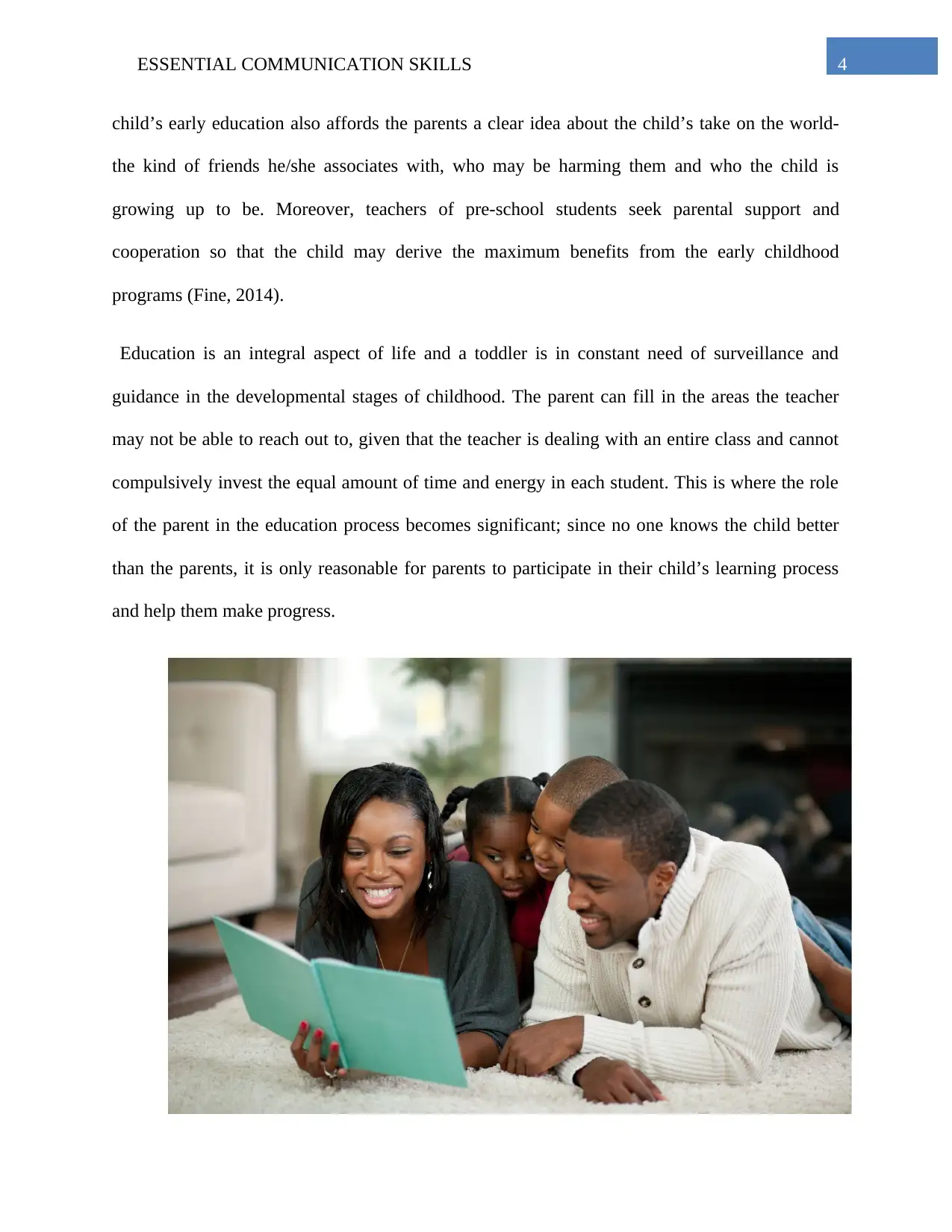
4ESSENTIAL COMMUNICATION SKILLS
child’s early education also affords the parents a clear idea about the child’s take on the world-
the kind of friends he/she associates with, who may be harming them and who the child is
growing up to be. Moreover, teachers of pre-school students seek parental support and
cooperation so that the child may derive the maximum benefits from the early childhood
programs (Fine, 2014).
Education is an integral aspect of life and a toddler is in constant need of surveillance and
guidance in the developmental stages of childhood. The parent can fill in the areas the teacher
may not be able to reach out to, given that the teacher is dealing with an entire class and cannot
compulsively invest the equal amount of time and energy in each student. This is where the role
of the parent in the education process becomes significant; since no one knows the child better
than the parents, it is only reasonable for parents to participate in their child’s learning process
and help them make progress.
child’s early education also affords the parents a clear idea about the child’s take on the world-
the kind of friends he/she associates with, who may be harming them and who the child is
growing up to be. Moreover, teachers of pre-school students seek parental support and
cooperation so that the child may derive the maximum benefits from the early childhood
programs (Fine, 2014).
Education is an integral aspect of life and a toddler is in constant need of surveillance and
guidance in the developmental stages of childhood. The parent can fill in the areas the teacher
may not be able to reach out to, given that the teacher is dealing with an entire class and cannot
compulsively invest the equal amount of time and energy in each student. This is where the role
of the parent in the education process becomes significant; since no one knows the child better
than the parents, it is only reasonable for parents to participate in their child’s learning process
and help them make progress.
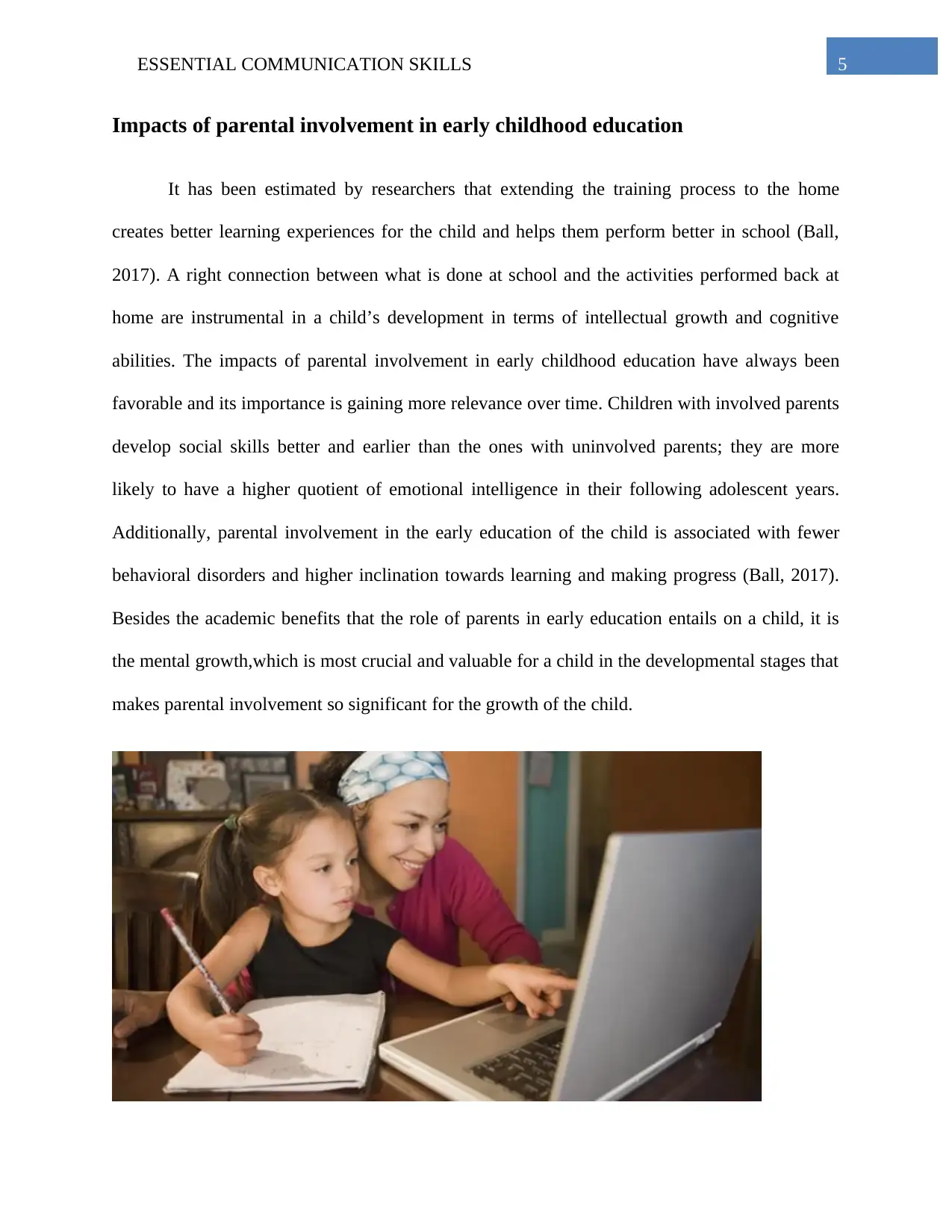
5ESSENTIAL COMMUNICATION SKILLS
Impacts of parental involvement in early childhood education
It has been estimated by researchers that extending the training process to the home
creates better learning experiences for the child and helps them perform better in school (Ball,
2017). A right connection between what is done at school and the activities performed back at
home are instrumental in a child’s development in terms of intellectual growth and cognitive
abilities. The impacts of parental involvement in early childhood education have always been
favorable and its importance is gaining more relevance over time. Children with involved parents
develop social skills better and earlier than the ones with uninvolved parents; they are more
likely to have a higher quotient of emotional intelligence in their following adolescent years.
Additionally, parental involvement in the early education of the child is associated with fewer
behavioral disorders and higher inclination towards learning and making progress (Ball, 2017).
Besides the academic benefits that the role of parents in early education entails on a child, it is
the mental growth,which is most crucial and valuable for a child in the developmental stages that
makes parental involvement so significant for the growth of the child.
Impacts of parental involvement in early childhood education
It has been estimated by researchers that extending the training process to the home
creates better learning experiences for the child and helps them perform better in school (Ball,
2017). A right connection between what is done at school and the activities performed back at
home are instrumental in a child’s development in terms of intellectual growth and cognitive
abilities. The impacts of parental involvement in early childhood education have always been
favorable and its importance is gaining more relevance over time. Children with involved parents
develop social skills better and earlier than the ones with uninvolved parents; they are more
likely to have a higher quotient of emotional intelligence in their following adolescent years.
Additionally, parental involvement in the early education of the child is associated with fewer
behavioral disorders and higher inclination towards learning and making progress (Ball, 2017).
Besides the academic benefits that the role of parents in early education entails on a child, it is
the mental growth,which is most crucial and valuable for a child in the developmental stages that
makes parental involvement so significant for the growth of the child.
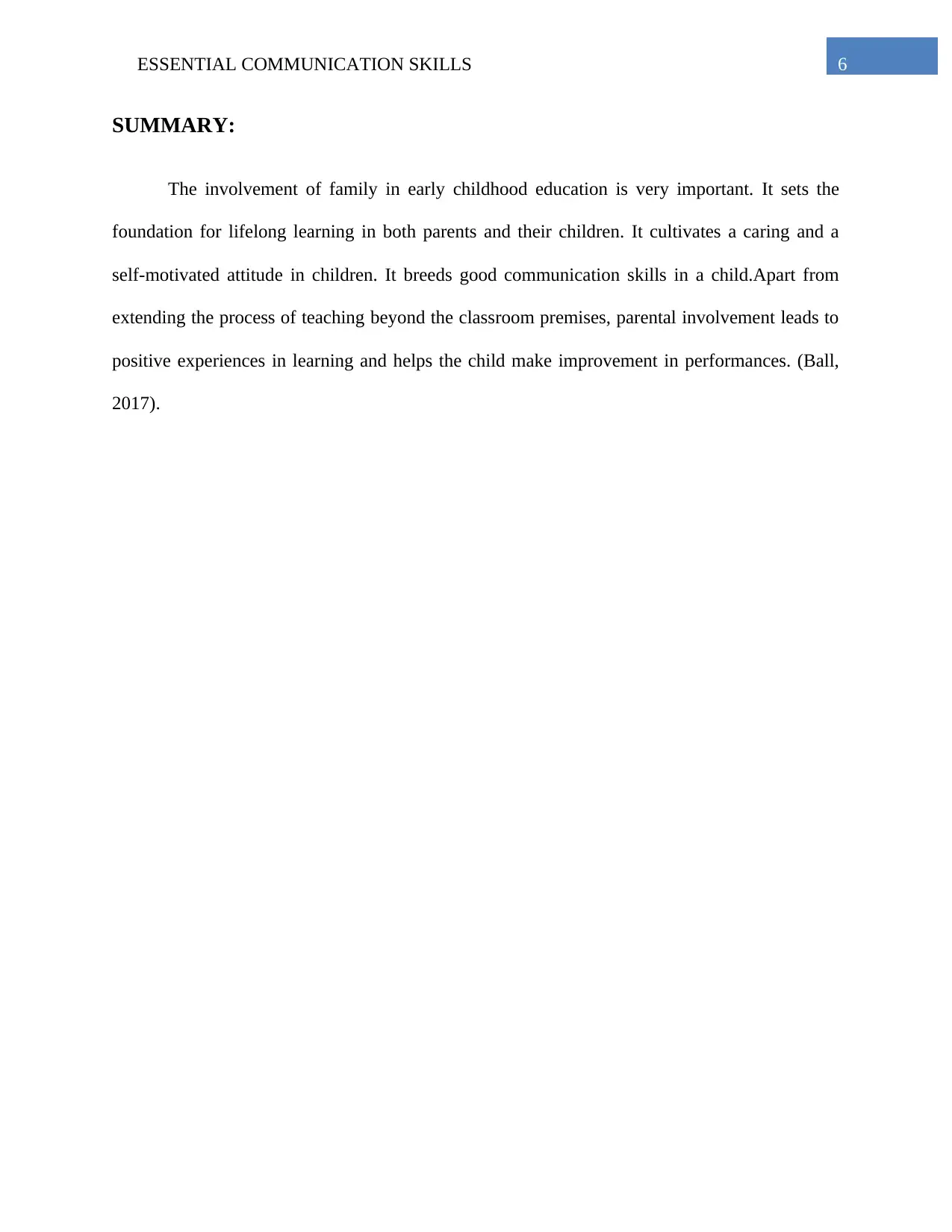
6ESSENTIAL COMMUNICATION SKILLS
SUMMARY:
The involvement of family in early childhood education is very important. It sets the
foundation for lifelong learning in both parents and their children. It cultivates a caring and a
self-motivated attitude in children. It breeds good communication skills in a child.Apart from
extending the process of teaching beyond the classroom premises, parental involvement leads to
positive experiences in learning and helps the child make improvement in performances. (Ball,
2017).
SUMMARY:
The involvement of family in early childhood education is very important. It sets the
foundation for lifelong learning in both parents and their children. It cultivates a caring and a
self-motivated attitude in children. It breeds good communication skills in a child.Apart from
extending the process of teaching beyond the classroom premises, parental involvement leads to
positive experiences in learning and helps the child make improvement in performances. (Ball,
2017).
Paraphrase This Document
Need a fresh take? Get an instant paraphrase of this document with our AI Paraphraser
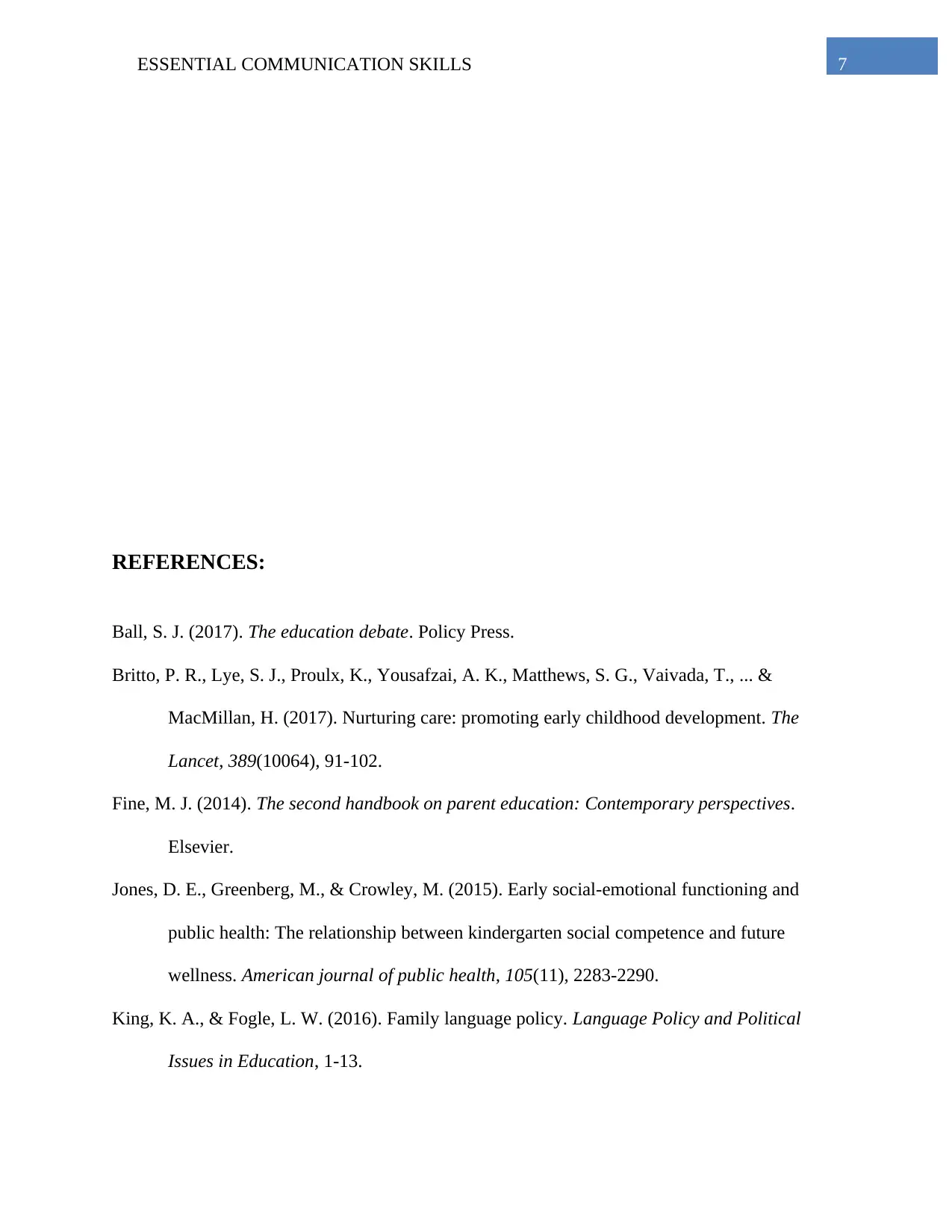
7ESSENTIAL COMMUNICATION SKILLS
REFERENCES:
Ball, S. J. (2017). The education debate. Policy Press.
Britto, P. R., Lye, S. J., Proulx, K., Yousafzai, A. K., Matthews, S. G., Vaivada, T., ... &
MacMillan, H. (2017). Nurturing care: promoting early childhood development. The
Lancet, 389(10064), 91-102.
Fine, M. J. (2014). The second handbook on parent education: Contemporary perspectives.
Elsevier.
Jones, D. E., Greenberg, M., & Crowley, M. (2015). Early social-emotional functioning and
public health: The relationship between kindergarten social competence and future
wellness. American journal of public health, 105(11), 2283-2290.
King, K. A., & Fogle, L. W. (2016). Family language policy. Language Policy and Political
Issues in Education, 1-13.
REFERENCES:
Ball, S. J. (2017). The education debate. Policy Press.
Britto, P. R., Lye, S. J., Proulx, K., Yousafzai, A. K., Matthews, S. G., Vaivada, T., ... &
MacMillan, H. (2017). Nurturing care: promoting early childhood development. The
Lancet, 389(10064), 91-102.
Fine, M. J. (2014). The second handbook on parent education: Contemporary perspectives.
Elsevier.
Jones, D. E., Greenberg, M., & Crowley, M. (2015). Early social-emotional functioning and
public health: The relationship between kindergarten social competence and future
wellness. American journal of public health, 105(11), 2283-2290.
King, K. A., & Fogle, L. W. (2016). Family language policy. Language Policy and Political
Issues in Education, 1-13.
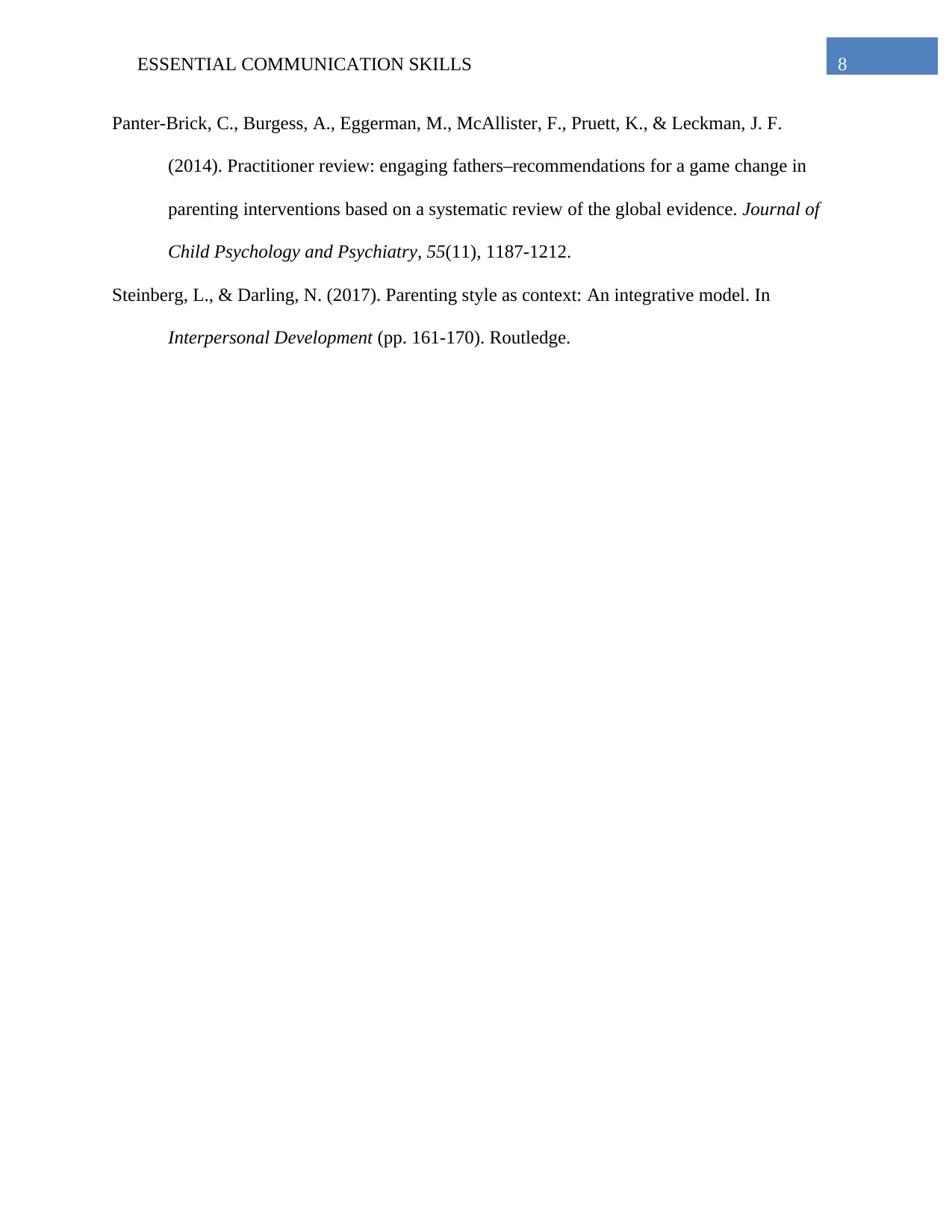
8ESSENTIAL COMMUNICATION SKILLS
Panter‐Brick, C., Burgess, A., Eggerman, M., McAllister, F., Pruett, K., & Leckman, J. F.
(2014). Practitioner review: engaging fathers–recommendations for a game change in
parenting interventions based on a systematic review of the global evidence. Journal of
Child Psychology and Psychiatry, 55(11), 1187-1212.
Steinberg, L., & Darling, N. (2017). Parenting style as context: An integrative model. In
Interpersonal Development (pp. 161-170). Routledge.
Panter‐Brick, C., Burgess, A., Eggerman, M., McAllister, F., Pruett, K., & Leckman, J. F.
(2014). Practitioner review: engaging fathers–recommendations for a game change in
parenting interventions based on a systematic review of the global evidence. Journal of
Child Psychology and Psychiatry, 55(11), 1187-1212.
Steinberg, L., & Darling, N. (2017). Parenting style as context: An integrative model. In
Interpersonal Development (pp. 161-170). Routledge.
1 out of 9
Related Documents
Your All-in-One AI-Powered Toolkit for Academic Success.
+13062052269
info@desklib.com
Available 24*7 on WhatsApp / Email
![[object Object]](/_next/static/media/star-bottom.7253800d.svg)
Unlock your academic potential
© 2024 | Zucol Services PVT LTD | All rights reserved.





